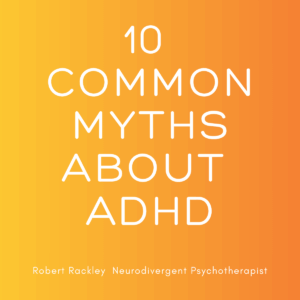
ADHD (Attention Deficit Hyperactivity Disorder) is still one of the most misunderstood neurodevelopmental conditions — especially in adults.
Despite growing awareness, many outdated beliefs continue to shape how people think about ADHD, how they judge themselves, and how others judge them.
As a psychotherapist specialising in ADHD and neurodivergence, I see the impact of these myths every day. Many clients come to therapy feeling ashamed, “lazy,” or “not good enough,” only to realise they were living under misinformation — not personal failure.
It’s time to set the record straight.
Below are 10 of the most common myths about ADHD — and the truth behind them.
1. Myth: ADHD is just hyperactivity
Truth: Many people with ADHD have no visible hyperactivity at all.
Inattentive ADHD is often quiet, internal, and easy to miss — particularly in girls and adults who learned to mask from a young age.
Symptoms can include mental fog, daydreaming, or feeling “disconnected.”
2. Myth: ADHD is caused by bad parenting
Truth: ADHD is neurological, not behavioural.
Parenting does not cause ADHD.
Environment can influence coping, but the underlying ADHD traits come from brain-based differences in regulation and executive function.
3. Myth: ADHD only affects children
Truth: ADHD is lifelong.
While some traits change over time, many adults don’t discover they have ADHD until their 30s, 40s, 50s, or later — often after years of burnout, anxiety, or chronic overwhelm.
4. Myth: “Everyone’s a bit ADHD”
Truth: Everyone gets distracted sometimes — but ADHD affects:
attention
working memory
time perception
emotional regulation
motivation
executive functioning
…every single day.
ADHD isn’t about being quirky or disorganised — it’s a real, clinically recognised condition.
5. Myth: ADHD is laziness or lack of motivation
Truth: People with ADHD often work twice as hard to manage daily tasks.
This misunderstanding ignores the neurological challenges behind:
task initiation
sustained focus
prioritising
managing overwhelm
It’s not laziness. It’s a regulation disorder, not a willpower disorder.
6. Myth: If you can focus on games or Netflix, you don’t have ADHD
Truth: This is called hyperfocus, a common ADHD trait.
ADHD isn’t an attention deficit — it’s an attention regulation difference.
You may struggle to focus on low-interest tasks while becoming intensely absorbed in high-interest ones.
7. Myth: ADHD is overdiagnosed
Truth: ADHD is underdiagnosed, especially among:
women
adults
autistic individuals
people who learned to mask
those mistaken for “anxious,” “sensitive,” or “high-achieving”
Many adults reach burnout before ever realising ADHD was there all along.
8. Myth: You just need more discipline
Truth: ADHD affects the brain’s ability to:
plan
organise
prioritise
transition between tasks
sustain effort
It’s not about caring less — it’s about the brain struggling with the “how,” not the “why.”
9. Myth: Medication is dangerous or a quick fix
Truth: ADHD medication is one of the most well-researched treatments in mental health.
For many adults, it improves focus, emotional regulation, and daily functioning.
It’s not a cure — it’s a tool, often used alongside therapy, structure, and ADHD-friendly strategies.
10. Myth: You’ll grow out of it
Truth: ADHD doesn’t disappear with age.
Adults often develop better coping strategies, but the core traits remain.
Support at any age is valid and important — especially if you’ve spent years masking or struggling silently.
Final Thoughts
If you’ve recognised yourself in any of these myths, you’re not alone.
So many ADHD adults spend their lives trying harder instead of getting the right support.
Understanding your brain is the first step toward healing.
Support is available — whether you’re newly diagnosed, seeking clarity, or trying to make sense of long-standing patterns.
👉 Explore my ADHD courses and resources: www.robertrackley.ie/courses
👉 ADHD-affirming therapy (Limerick & online): www.robertrackley.ie
